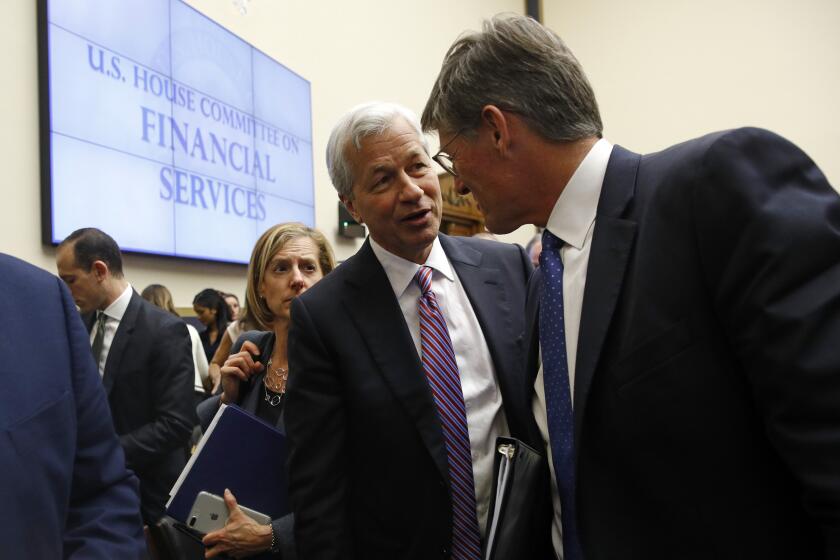Column: With his Truth Social stock, Trump may be laughing all the way to the bank — but his investors have reason to weep

With their life savings, childrens’ college funds and their own retirement prospects at stake, most people probably view investing in stocks as a serious business. Now and then, however, the markets produce comedy gold.
Hello, Trump Media & Technology Group.
The owner of Truth Social, a social media platform exclusively hitched to Donald Trump, staged an initial public offering March 26 amid a torrent of speculation over how many billions the IPO would produce for Trump himself. In the event, the figure was a paper gain of about $5 billion for him, virtually pure profit.
It’s a scam. Just like everything he’s ever been involved in, it’s a con.
— Barry Diller on Trump and Trump Media
The cult of Trump had sent the shares soaring as high as $79.38 on that first day, valuing the company at about $9.5 billion. By the end of the day it had settled back to $57.99. Since then, it has mostly been on the schneid, falling steadily.
As I write, midway in the trading day Tuesday, the shares are quoted at $22.80, down more than 14% on the day. That brings the shares’ slide since they peaked at $79.38 on March 26 to about 70.2%.
Get the latest from Michael Hiltzik
Commentary on economics and more from a Pulitzer Prize winner.
You may occasionally receive promotional content from the Los Angeles Times.
Trump, who loves hyperbole, might revel in a three-week plunge that could be some sort of a record. Whether he would call it “beautiful,” one of his favorite superlatives, is another question.
The slide has pared the market value of Trump Media by more than $6 billion from its peak. Trump is still sitting on a paper holding worth more than $2 billion, but his outside investors, many of whom are small investors who bought at or near the top, have been been taken to the abattoir.
“I think they’re dopes,” the veteran entertainment executive Barry Diller said of Trump Media’s investors during a CNBC appearance on April 4.
That’s not to say, given the stock’s volatility, that it might not recover and end up in the green for the day, though whether it can recover the full 69.8% loss, even over time, is subject to doubt.
Still, the raw numbers, being right there for everyone to view in bright red, aren’t as interesting as the underlying grift. Let’s examine that.
Truth Social is going public as a money-losing front for Donald Trump. Why would anyone invest in it?
It’s fair to say that few if any experienced investment professionals expect Trump Media to have staying power as a high-flying stock. I raised the most pertinent issues a few days before the IPO: The company had meager revenues and huge losses. It was to be taken public via a device — a special purpose acquisition company, or SPAC — that was often used to circumvent government rules for disclosures to investors.
Trump Media’s expected value of $5 billion at the IPO swore at common sense, or at any traditional standard of securities valuation. In short, Trump Media looked like any number of other Trump ventures, such as Trump University — all promise, no delivery.
“It’s a scam,” Diller told his CNBC interviewers. “Just like everything he’s ever been involved in, it’s a con.”
No one at Truth Social responded to my request for a comment about Diller’s remark.
Earlier, I asked whether anyone should believe in the valuation projections, and whether anyone in their right mind would invest. My answers were probably not, and probably not. That was conjecture, not investment advice.
After the IPO, however, more issues were disclosed that contributed to the stock’s precipitous slide. The company’s first annual report, issued April 1, incorporated an obligatory section on risk factors to be pondered by investors that included the traditional warnings about the costs of competition, the prospects of litigation, and the dangers of technology failures — and a couple that aren’t normally seen in corporate disclosures.
One covered the downsides of Trump Media’s linkage with Trump — that Truth Social faced “greater risks than typical social media platforms because of ... the involvement of President Trump.” Those risks include “harassment of advertisers or content providers, increased risk of hacking of [Truth Social’s] platform, lesser need for Truth Social if First Amendment speech is no longer believed to be suppressed by other similar platforms, criticism of Truth Social for its moderation practices, and increased stockholder suits.”
Trump and Robert F. Kennedy issued attacks on child vaccinations, including for polio, last week. They want to return us to the 1950s, when preventable diseases struck millions of Americans.
The report made clear, if anyone was unaware of this, that the value of its brand “may diminish if the popularity of President Trump were to suffer,” as it would from “the death, incarceration, or incapacity of President Trump.”
Perhaps more telling was the company’s disclosure that it was not planning to “collect, monitor or report” the traditional metrics used by other social media platforms, such as Meta and X (formerly Twitter). Among those performance measures are “average revenue per user, ad impressions and pricing, ... monthly and daily active users” — in other words, all the statistics that tell a social media company who, if anyone, is using it, and what their participation is worth in dollars and cents.
Having that information would only “divert” the company’s management, the report said, though it wasn’t clear about how management would fashion a strategy for the future if it doesn’t know where it is at present, including just how many users it has.
The annual report also updated Trump Media’s financial statements to cover the full year 2023: The platform lost more than $58 million on revenue of a bare $4.1 million. Previous disclosures had covered only the first nine months of 2023, when the company said it lost $49 million on $3.4 million in revenue.
On Monday, shareholders got another surprise. Trump Media said in a public filing that it planned to issue 40 million new shares to insiders (36 million of them to Trump himself) and that warrant holders were entitled to 21.5 million additional shares of stock, which could be expected to reach the open market almost immediately upon the warrants’ conversion.
That means existing shareholders are about to be heavily diluted, left with less of the company than they anticipated. The shares plunged more than 18% on Monday.
Who benefits from these maneuvers? Trump does. He is in effect the owner of 64.9% of the company, including the 36 million new shares; no one else owns more than 7.3%. For him this isn’t much of an investment; 36 million of his 114.7 million shares are a handout that didn’t require him to put up his own money. The rest were issued to him via the IPO in return for his interest in Trump Media as a private company.
Following a tradition of know-nothing pronouncements at the World Economic Forum, JPMorgan CEO Jamie Dimon declares Trump right about immigration, tax cuts, NATO and the economy.
Trump’s financial role in the founding of Truth Social in 2021 may have been minimal or nonexistent; Reuters reported in 2022 that most of the $38 million raised in the company’s first year came from businessmen who were political allies of Trump and from borrowings from unidentified lenders.
Trump has almost no ability to convert his shareholdings to cash in the near term, however. As a Trump Media insider, he is prevented from selling or borrowing against his shares for at least six months.
If and when he places any of his shares on the market, he would be selling into a declining market. Trump Media is the memiest of “meme stocks,” its value entirely divorced from financial fundamentals and based entirely on his involvement in the enterprise.
That places the value of his stake on a knife-edge. Any indication that he is reducing his commitment would almost certainly provoke a stampede for the exits among other shareholders. Trump would be racing to cash in before the value of his holdings reached the vanishing point.
Who are the other shareholders? According to a survey by the Washington Post, many are retail investors who believe that Trump’s touch is gold, or thought that buying his shares was a way to express faith in Trump and perhaps make some money on the side. At this moment, they are staring into the abyss.
More to Read
Get the latest from Michael Hiltzik
Commentary on economics and more from a Pulitzer Prize winner.
You may occasionally receive promotional content from the Los Angeles Times.














